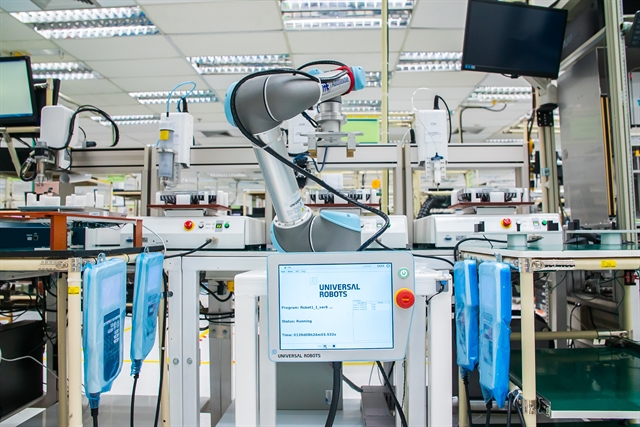Denmark-based collaborative robots (cobots) manufacturer, Universal Robots, urged Viet Nam’s firms to accelerate the adoption of robotic automation in order to remain competitive and efficient ahead of tough economic times.

Denmark-based collaborative robots (cobots) manufacturer, Universal Robots, urged Viet Nam’s firms to accelerate the adoption of robotic automation in order to remain competitive and efficient ahead of tough economic times.
With volatile market conditions and constant disruption, leveraging automation to optimise production is a constant challenge. A new class of robots, dubbed “collaborative robots” aims to bridge the gap between fully-manual assembly and fully-automated manufacturing lines. Universal Robots highlights that cobots could potentially improve productivity for Viet Nam’s manufacturing sector by up to 30 per cent.
“As one of the fastest growing economies in the world, Viet Nam is fast becoming a competitive industrial player. With government pushing forward for science and technology development and with priorities in Industry 4.0 in its 2011-20 Strategy, Viet Nam is set for vibrant growth in the manufacturing industry,” said Darrell Adams, Universal Robots’ head of Southeast Asia & Oceania.
“Cobots fit snugly into the Vietnamese market, where humans and robots share tasks along a production line. With the assistance of cobots, local manufacturers can achieve higher levels of efficiency and rapid productivity gains.”
He explained that cobots can easily be re-programmed to solve new tasks to meet the short-run production challenge faced by companies and thereafter, adjusted to ever more advanced processing in smaller batch sizes. The adoption of cobots can help expand the manufacturing sector’s contribution to the economy and boost innovation and capacity for small & medium Enterprises (SMEs).
Viet Nam’s manufacturing industry is a key growth driver of the economy. In 2018, it accounted for 16 per cent of the country’s total GDP, reaching a value of VND886.58 trillion (US$38 billion). In 2019, it contributed to an 8.86 per cent growth of the industry. However, the average automation levels among local manufacturing firms are still low. Automation can potentially raise productivity and GDP growth in Viet Nam, generating higher incomes for workers and market opportunities for companies.
According to Universal Robots, firms that have gone the automation route have increased production by as much as 300 per cent; while reducing defects by 90 per cent and lifting profits by 20 per cent. Universal Robots is targeting key industries such as electronics, automotive, semiconductor, food & beverage, furniture and consumer products.
“Tomorrow’s workplace will be run by highly-skilled workers assisted by intelligent devices. Cobots help automate and streamline repetitive and potentially unsafe processes, thus ensuring a safe work environment while increasing productivity and efficiency,” added Adams.
Cobots are now the fastest-growing segment of industrial automation, with the yearly annual revenue for cobot arms expected to reach $11.8 billion by 2030, up from $1.9 billion in 2018, according to the global technology market advisory firm ABI Research. — VNS





